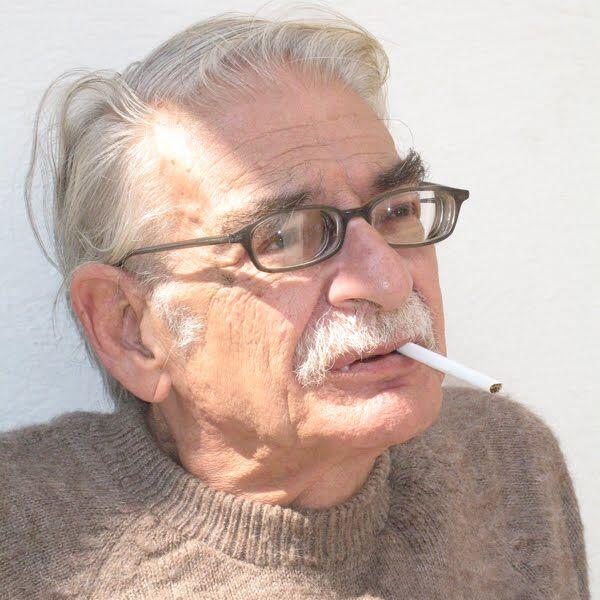
From Bodies One (Cuerpos I)
By Max Rojas
Translated by Zane Koss and Gerónimo Sarmiento Cruz
Pity is abandoned
00000000000000and the merciless resounds
like a weary trombone.
00000000000000000The palpable is cement,
0000000000000000000000000000000000rocky matter.
Like a weary thrombing,
00000000000000000the real
—or that which they say is the real—
thrombs its own samenesses,
is cooked in the coldening
00000000000000000that heartbreak would leave behind.
The fundament is grey
00000000000000like a wall with meningitis.
Rumors of rain
000000000000—but no,
not a drop of water falls
on the furnace to half soothe the wound.
Cement and the trombone,
00000000000000000thrombic,
0000000000000000000000000coughs,
00000000000000000000000000000000clears its throat,
kindly holds mass for the deceased,
absent body of the beloved woman,
little bits of quicklime,
good rum to attend the wake with joy.
Clears its throat,
000000000000twitches
00000000000000000—twitched, the one with the trombone,
thrombs
000000and burns a cigarette,
sips mezcal, scrubs,
monotonous,
000000000000tense.
The cough that advances
00000000000000000between livid sternums,
livid light that leaves an absent body,
000000000000000000000000000livid lightness,
000000000000dense night.
Waterspout, the trombonist,
000000000000000000000like a furnace in flames.
After impiety,
the impious that falls like a boiling cauldron.
Body that was flesh and that is
only an abstract form,
00000000000000000weightless,
like a trombone that certifies demises.
Cement is a quality of oblivions,
of tearings,
the body is inventoried cement
000000000000000000000—remembrances.
The sound of the trombone that finishes
silent and withered
00000000000000000—and dies.
Se deja en piedad
00000000000000y lo inmisericorde es lo que suena
como trombón hastiado.
00000000000000000Lo palpable es cemento,
0000000000000000000000000000000000asunto pedregoso.
Como trombar hastiado,
00000000000000000lo real
—o lo que dicen que es lo real—
se tromba en sus propias mismidades,
se cuece en el fríal
00000000000000000que desamor dejara.
Lo fundamento es gris
00000000000000como pared con meningitis.
Rumórase que llueve
000000000000—pero no,
ni un chorro de agua cae
sobre el fogón para medio apagar la herida.
Cemento y el trombón,
00000000000000000tromboso,
0000000000000000000000000tose,
00000000000000000000000000000000carraspea,
amablemente obsequia misas de difunto,
cuerpo ausente de mujer amada,
pedacitos de cal,
buen ron para ir con gusto a los velorios.
Carraspea,
000000000000se crispa
00000000000000000—crispado del del trombón,
tromba
000000y enciende un cigarillo,
mezcaleando, estropajeando,
monocorde,
000000000000tenso.
Lo tósese que avanza
entre esternones lívidos,
lívida luz que deja cuerpo ausente,
000000000000000000000000000lívida liviandad,
000000000000dense noche.
Tromba, el del trombón,
000000000000000000000como fogón en llamas.
Luego de la impiedad,
lo impío que cae como un caldero hirviente.
Cuerpo que fue carne y que es
Sólo una forma abstracta,
00000000000000000leve,
como trombón que certifica defunciones.
Cemento es cualidad de olvidos,
de desgajes,
cuerpo es cemento inventariado
000000000000000000000—remembranzas.
El sonidazo del trombón que finiquita
callado y mustio
00000000000000000—y muere.

Max Rojas is considered in Mexico to be a true poet’s poet, in addition to being a recognized essayist, literary critic, and novelist. Rojas was born in 1940 in Mexico City and studied philosophy at the National Autonomous University of Mexico. At eighteen, Rojas joined the Communist Party, beginning a life-long commitment to the labor movement. He also served as director of the Museo Casa de Leon Trotsky from 1994 to 1998. In 1971 he financed his first book of poetry, El turno del aullante, in a print run of 100 copies, later republished in 1983. In 1986, he published his second book of poems, Ser en la sombra, before falling silent for over twenty years. He re-emerged in the late 2000s with the first installments of Cuerpos. Rojas’s poetry was relatively unknown throughout most of his life, though his early writings were popular with members of the Infrarealist group, including Roberto Bolaño and Mario Santiago Papasquiaro. After Cuerpos received the Carlos Pellicer Iberoamerican Prize in Poetry in 2009, his singular style attained some notoriety, making him a more influential figure in contemporary Mexican poetry. Rojas died in 2015 at the age of 74.

Zane Koss is a poet, translator, and scholar. His critical and creative work can be found in tripwire, Asymptote, Jacket2, the Chicago Review, the /temz/ Review, and elsewhere. He has published four chapbooks of poetry, The Odes (incomplete) and Invermere Grids (above/ground, 2020 and 2019), job site (Blasted Tree, 2018) and Warehouse Zone (PS Guelph, 2015).

Gerónimo Sarmiento Cruz is a Humanities Teaching Fellow at the University of Chicago and editor of Chicago Review. His translations, poetry, and criticism have appeared in tripwire, Denver Quarterly, Asymptote, La Tempestad, Chicago Review, and elsewhere.
Poesía en acción is an Action Books blog feature for Latin American and Spanish poetry in translation and the translator micro-interview series. It was created by Katherine M. Hedeen and is currently curated and edited by Olivia Lott with web editing by Paul Cunningham.